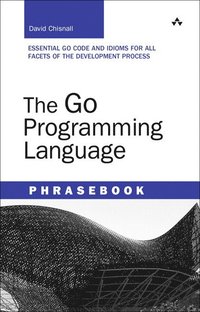
- Format
- Häftad (Paperback)
- Språk
- Engelska
- Antal sidor
- 288
- Utgivningsdatum
- 2012-05-16
- Upplaga
- 1
- Förlag
- ADDISON-WESLEY
- Dimensioner
- 175 x 114 x 23 mm
- Vikt
- Antal komponenter
- 1
- ISBN
- 9780321817143
- 227 g
Kundrecensioner
Övrig information
David Chisnall is a freelance writer and software developer, who has worked on compilers for numerous languages ranging from Smalltalk to GPU-based C++. He is an active contributor to a number of open source projects and occasionally visits academia to teach. He is the author of Cocoa Programming Developer's Handbook (Addison-Wesley, 2009) and Objective-C Phrasebook (Addison-Wesley, 2011). He lives in Swansea, Wales.
Innehållsförteckning
1 Introducing Go 1
Go and C 1
Why Go? 4
Goroutines and Channels 7
Selecting a Compiler 10
Creating a Simple Go Program 13
The Go Type System 14
Understanding the Memory Model 16
2 A Go Primer 21
The Structure of a Go Source File 23
Declaring Variables 26
Declaring Functions 29
Looping in Go 32
Creating Enumerations 35
Declaring Structures 37
Defining Methods 39
Implementing Interfaces 42
Casting Types 47
3 Numbers 51
Converting Between Strings and Numbers 52
Using Large Integers 54
Converting Between Numbers and Pointers 56
4 Common Go Patterns 61
Zero Initialization 62
Generic Data Structures 67
Specialized Generic Data Structures 69
Implementation Hiding 72
Type Embedding 75
5 Arrays and Slices 79
Creating Arrays 81
Slicing Arrays 83
Resizing Slices 85
Truncating Slices 87
Iterating Over Arrays 88
6 Manipulating Strings 91
Comparing Strings 92
Processing a String One Character at a Time 94
Processing a Partial String 96
Splitting and Trimming Strings 98
Copying Strings 102
Creating Strings from Patterns 102
Matching Patterns in Strings 104
7 Working with Collections 107
Creating a Map 108
Storing Unordered Groups of Objects 111
Using Lists 112
Defining New Collections 114
8 Handling Errors 117
Deferring Cleanup 118
Panicking and Recovering 121
Returning Error Values 125
Error Delegates 127
9 Goroutines 131
Creating Go...
